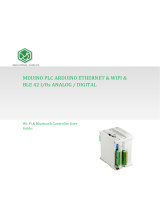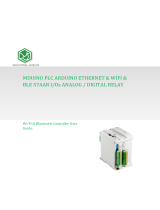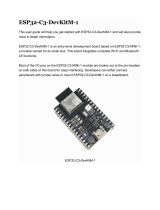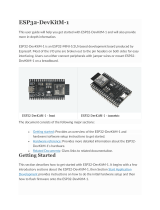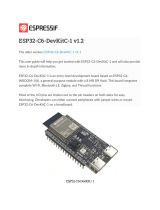
MDUINO PLC ARDUINO ETHERNET & WIFI &
BLE 38AR I/Os ANALOG / DIGITAL RELAY PLUS
Wi-Fi & Bluetooth
Controller User Guide:

Preface
This User Guide is been implemented by Boot & Work, S.L. working
under the name Industrial Shields.
Purpose of the manual
The information contained in this manual can be used as a reference to operating, to
functions, and to the technical data of the signal modules, power supply modules and
interface modules.
Intended Audience
This User Guide is intended for the following audience:
Persons in charge of introducing automation devices.
Persons who design automation systems.
Persons who install or connect automation devices.
Persons who manage working automation installation.
Warnings:
Unused pins should not be connected. Ignoring the directive may damage the
controller.
Improper use of this product may severely damage the controller.
Refer to the controller’s User Guide regarding wiring considerations.
Before using this product, it is the responsibility of the user to read the product’s User
Guide and all accompanying documentation.

Application Considerations and Warranty
Read and Understand this Manual
Please read and understand this manual before using the product. Please consult your
comments or questions to Industrial Shields before using the product.
Application Consideration
THE PRODUCTS CONTAINED IN THIS DOCUMENT ARE NOT SAFETY RATED.
THEY SHOULD NOT BE RELIED UPON AS A SAFETY COMPONENT OR
PROTECTIVE DEVICE FOR ENSURING SAFETY OF PERSONS, AS THEY ARE
NOT RATED OR DESSIGNED FOR SUCH PURPOSES.
Please know and observe all prohibitions of use applicable to the products.
FOR AN APPLICATION INVOLVING SERIOUS RISK TO LIFE OR PROPERTY
WITHOUT ENSURING THAT THE SYSTEM AS A WHOLE HAS BEEN DESSIGNED
TO ADDRESS THE RISKS, NEVER USE THE INDUSTRIAL SHIELDS PRODUCTS.
NEVER USE THE INDUSTRIAL SHIELDS PRODUCTS BEFORE THEY ARE
PROPERLY RATED AND INSTALLED FOR THE INTENDED USE WITHIN THE
OVERALL EQUIPMENT OR SYSTEM.
Industrial Shields shall not be responsible for conformity with any codes, regulations or
standards that apply to the combination of products in the customer’s application or use
of the product.
The following are some examples of applications for which particular attention must be
given. This is not intended to be an exhaustive list of all possible uses of the products,
nor is it intended to imply that the uses may be suitable for the products:
Systems, machines, and equipment that could present a risk to life or property.
Nuclear energy control systems, combustion systems, railroad systems,
aviation systems, medical equipment, amusement machines, vehicles, safety
equipment, and installation subject to separate industry or government
regulations.
Outdoor use, uses involving potential chemical contamination or electrical
interference, or conditions or uses not described in this document.
At the customer’s request, INDUSTRIAL SHIELDS will provide applicable third party
certification documents identifying ratings and limitations of use that apply to the
products. This information by itself is not sufficient for a complete determination of the
suitability of the products in combination with the system, machine, end product, or
other application or use.

Disclaimers
Weights and Dimensions
Dimensions and weights are nominal and they are not used for manufacturing
purposes, even when tolerances are shown.
Performance Data
The performance data given in this manual is provided as a guide for the user in
determining suitability and does not constitute a warranty. It may represent the result of
INDUSTRIAL SHIELDS’s test conditions, and the users most correlate it to actual
application requirements. Actual performance is subject to the INDUSTRIAL SHIELDS
Warranty and Limitations of Liability.
Change in Specifications
Product specifications and accessories may be changed at any time based on
improvements and other reasons.
It is our practice to change model numbers when features are changed, or published
ratings or when significant construction changes are made. However, some
specifications of the products may be changed without any notice. When in doubt,
special numbers may be assigned to fix or stablish key specifications for your
application on your request. Please consult with your INDUSTRIAL SHIELDS
representative at any time to confirm actual specifications of purchased products.
Errors and Omissions
The information in this document has been carefully checked and is believed to be
accurate; however, no responsibility is assumed for clerical, typographical, or
proofreading errors, or omissions.

Warranty and Limitations of Liability
Warranty
Industrial Shields’s exclusive warranty is that the products are free from defects in
materials and workmanship for a period of one year (or other period if specified) from
date of sale by Industrial Shields.
INDUSTRIAL SHIELDS MAKES NO REPRESENTATION OR WARRANTY,
EXPRESSED OR IMPLIED, REGARDING MERCHANABILITY, NON-
INFRINGEMENT, OR FITNESS FOR PARTICULAR PURPOSE OF THE PRODUCTS.
ANY BUYER OR USER ACKNOWLEDGES THAT THE BUYER OR USER ALONE
HAS DETERMINED THAT THE PRODUCTS WILL SUITABLY MEET THE
REQUIREMENTS OF THEIR INTENDED USE. INDUSTRIAL SHIELDS DISCLAIMS
ALL OTHER WARRANTIES, EXPRESS OR IMPLIED
Limitations of Liability
INDUSTRIAL SHIELDS SHALL NOT BE RESPONSIBLE FOR SPECIAL, INDIRECT,
OR CONSEQUENTIAL DAMAGES, LOSS OF PROFITS OR COMERCIAL LOSS IN
ANY WAY CONNECTED WITH THE PRODUCTS, WHETHER SUCH CLAIM IS
BASED ON CONTRACT, WARRANTY, NEGLIGENCE, OR STRICT LIABILITY.
IN NO EVENT SHALL INDUSTRIAL SHIELDS BE RESPONISBLE FOR WARRANTY,
REPAIR OR OTHER CLAIMS REGARDING THE PRODUCTS UNLESS INDUSTRIAL
SHIELDS’S ANALYSIS CONFIRMS THAT THE PRODUCTS WERE PROPERLY
HANDLED, STORED, INSTALLED, AND MAINTAINED AND NOT SUBJECT TO
CONTAMINATION, ABUSE, MISUSE, OR INAPPROPIATE MODIFICATION OR
REPAIR.

Table of Contents
General Description Wi-Fi & Bluetooth CONTROLLER ...................................... 10 1
Zone - Nomenclature ...................................................................................................... 10 1.1
Zone Distribution ............................................................................................................. 11 1.2
A Zone Features............................................................................................................... 11 1.3
Mechanical dimension .................................................................................................... 12 1.4
General Features ............................................................................................................. 13 1.5
Technical Specifications: ........................................................................................... 14 2
General Specifications: .................................................................................................... 14 2.1
Performance Specification: ............................................................................................. 14 2.2
Precautions ................................................................................................................ 15 3
Arduino Board ................................................................................................................. 15 3.1
Intended Audience .......................................................................................................... 15 3.2
General Precautions ........................................................................................................ 15 3.3
Software interface ..................................................................................................... 15 4
How to connect PLC Arduino to PC ........................................................................... 19 5
How to connect PLC to power supply ....................................................................... 20 6
M-duino Family Pinout .............................................................................................. 21 7
A Zone connection .......................................................................................................... 21 7.1
B Zone (Analog Shield) .................................................................................................... 23 7.2
C Zone (Relay Shield) ....................................................................................................... 24 7.3
Switch Configuration ................................................................................................. 25 8
A Zone: Communications ................................................................................................ 25 8.1
Relay Shield ........................................................................ ¡Error! Marcador no definido. 8.2
I/Os 5V pins ............................................................................................................... 27 9
I2C pins – SDA/SCL .......................................................................................................... 28 9.1
Serial 0 – RX0/TX0 ........................................................................................................... 28 9.2
Serial 1 – RX1/TX1 ........................................................................................................... 28 9.3
SPI – MISO/MOSI/SCK ..................................................................................................... 29 9.4
Pin 2/Pin 3 ....................................................................................................................... 29 9.5
A Zone Features: Communications & RTC & uSD .................................................. 30 10

RS-232 ............................................................................................................................. 30
10.1
RS-485 ............................................................................................................................. 30 10.2
I2C .................................................................................................................................... 30 10.3
SPI .................................................................................................................................... 31 10.4
TTL ................................................................................................................................... 31 10.5
Ethernet ........................................................................................................................... 31 10.6
RTC................................................................................................................................... 31 10.7
uSD .................................................................................................................................. 32 10.8
WiFi & BLE ....................................................................................................................... 33 10.9
10.9.1 General Specifications: ........................................................................................ 33
10.9.2 WiFi & Bluetooth Module Configuration ............................................................ 33
I/O technical details: ............................................................................................. 36 11
Typical Connections .............................................................................................. 38 12
Connector details: ................................................................................................. 42 13
Mechanical Characteristics ................................................................................... 42 14

General Description Wi-Fi & Bluetooth CONTROLLER 1
Zone - Nomenclature
1.1
The nomenclature shown in this point will be used in the whole User Guide, so it is
important to understand this nomenclature.
The nomenclature to differentiate the zones is based on the Alphabet, being A the
shield from below and B the shield from above.
The inputs in the zone B are named I0.X, being X any number suitable in the
Shield. Digital Outputs are named as Q0.X and Analog Outputs as A0.X.
The inputs in the zone C are named I1.X, being X any number suitable in the
Shield. Relays as R1.X
A ZONE
B ZONE
C ZONE
C ZONE
B ZONE
A ZONE
C ZONE
B ZONE
A ZONE

Zone Distribution 1.2
A Zone Features 1.3
Shield
A Zone
Communication
Shield
(1x) Ethernet
(1x) USB
(1x) I2C
(3x) TTL
(1x) RS-232
(1x) HALF/FULL Duplex RS-485
(1x) SPI external Port
(1x) RTC
(1x) uSD Socket
(1x) WiFi & BLE

Mechanical dimension 1.4
M-Duino 2 BLOCK
I/Os
2.

General Features 1.5
CONECTABLE PLC ARDUINO 24Vcc M-DUINO
MODEL TYPE
WiFi & BLE Controller General Spec.
Input Voltage
12 to 24Vdc
Fuse protection (2.5A)
Polarity protection
I max.
1.5A
Size
101x119.5x70.1
101x119.5x119.3
Clock Speed
16MHz
Flash Memory
256KB of which 8KB used by bootloader
SRAM
8KB
EEPROM
4KB
Communications
I2C – Ethernet Port – USB – WiFi &BLE – RS485 – RS232 -- SPI
– (1x) Rx, Tx (Arduino pins)
Max232-Max485-W5500-ESP32
USB consideration!
Only meant for uploading or debugging, not always connected
as a serial in a project!
Cannot be working in a final
application
An/Dig Input 10bit
(0-10Vcc)
0 to 10V
Input Impedance: 39K
Separated PCB ground
Digital Isolated Input (24Vcc)
7 to 24Vdc
I min: 2 to 12 mA
Galvanic Isolation
* Interrupt isolated Input HS
(24Vcc)
7 to 24Vdc
I min: 2 to 12 mA
Galvanic Isolation
Analog Output 8bit
(0-10Vcc)
0 to 10Vdc
I max: 20 mA
Separated PCB ground
Digital Isolated Output (24Vcc)
5 to 24Vdc
I max: 70 mA
Galvanic Isolation
Diode Protected for Relay
Imax 24Vdc: 410 mA
PWM Isolated Output 8bit
(24Vcc)
5 to 24Vdc
I max: 70 mA
Galvanic Isolation
Diode Protected for Relay
Relay Output
I max: 5A
V max: 24VDC / 230VAC
Expandability
I2C - 127 elements - Serial Port RS232/RS485/WiFi/BLE
* By using this type of signal can no longer use Digital signal (24Vdc)

Technical Specifications: 2
General Specifications: 2.1
Item
M-DUINO B ZONE
Power supply
voltage
DC power supply
12 to 24Vdc
Operating
voltage range
DC power supply
11.4 to 25.4Vdc
Power
consumption
DC power supply
30VAC max.
External
power supply
Power supply
voltage
24Vdc
Power supply
output capacity
700Ma
Insulation resistance
20MΩ min.at 500Vdc between the AC terminals and the protective earth terminal.
Dielectric strength
2.300 VAC at 50/60 Hz for one minute with a leakage current of 10mA max. Between all the
external AC terminals and the protective ground terminal.
Shock resistance
80m/s2 in the X, Y and Z direction 2 times each.
Ambient temperature (operating)
0º to 45ºC
Ambient humidity (operating)
10% to 90% (no condensation)
Ambient environment (operating)
With no corrosive gas
Ambient temperature (storage)
-20º to 60ºC
Power supply holding time
2ms min.
Weight
552g max.
Performance Specification: 2.2
Arduino Board
ARDUINO MEGA 2560
Control method
Stored program method
I/O control method
Combination of the cyclic scan and immediate refresh processing methods.
Programming language
Arduino IDE. Based on wiring (Wiring is an Open Source electronics platform composed of a
programming language. “similar to the C”. http://arduino.cc/en/Tutorial/HomePage
Microcontroller
ATmega2560
Flash Memory
256KB of which 8KB are used by the bootloader
Program capacity (SRAM)
8KB
EEPROM
4KB
Clock Speed
16MHz
Clock Speed
16MHz

Precautions 3
Read this manual before attempting to use the WiFi & BLE PLC and follow its descriptions for
reference during operation.
Arduino Board 3.1
The MDUINO PLC ARDUINO ETHERNET & WIFI & BLE 38AR I/Os ANALOG/DIGITAL PLUS
includes an Arduino Mega Board as controller and a ESP32 Dev programmable chip as a Wi-Fi
& BLE gateway.
Intended Audience
3.2
This manual is intended for technicians, which must have knowledge on electrical systems.
General Precautions 3.3
The user must operate M-Duino according to the performance specifications described in this
manual.
Before using the MDUINO PLC ARDUINO ETHERNET & WIFI & BLE 38AR I/Os ANALOG / DIGITAL
PLUS under different conditions from what has been specified in this manual or integrating
into nuclear control systems, railroad systems, aviation systems, vehicles, combustion systems,
medical equipment, amusement machines, safety equipment and other systems, machines,
and equipment that may have a serious influence on lives and property if used improperly,
consult your INDUSTRIAL SHIELDS representative. Ensure that the rating and performance
characteristics of the Ethernet/WiFi/BLE Controller are sufficient for the systems, machines,
and equipment, and be sure to provide the systems, machines, and equipment double safety
mechanisms. This manual provides information for programming and operating the MDUINO
PLC ARDUINO ETHERNET & WIFI & BLE 38AR I/Os ANALOG / DIGITAL PLUS.
Software interface 4
Industrial Shields PLC are programmed using Arduino IDE, which is a software based on the C
language. They can also be programmed using directly C but it is much easier working with
Arduino IDE as it provides lots of libraries that helps in the programming.
Industrial Shields provides boards for programming the PLCs much easier. Basically it is no
needed to define the pins and if that pins are inputs or outputs. Everything is set up
automatically if using the boards.
In order to install Industrial Shields boards, these are the steps that must be followed.
Requirements:
Arduino IDE 1.8.0 or above (better to have always the latest version).

Steps:
1. Open Arduino IDE and go to: “File -> Preferences” located in the top left corner.
2. In Additional Boards Manager URLs write the following:
http://apps.industrialshields.com/main/arduino/boards/package_industrialshields_index.json
3. Press OK to save the changes.
4. Go to: Tools -> Board: … -> Boards Manager

5. Search for “industrialshields” on the browser.
6. Click install (selecting the latest version).
Following these steps you will be able to see now the Industrial Shields Boards:
Once it is selected the Ardbox Family or M-Duino family an extra option will appear on Tools:
There, it can be selected the exact model for every family. In this case M-Duino 38AR+

How to connect PLC Arduino to PC 5
- Connect USB port from PLC to PC.
NOTE:
M-Duino Family uses USB-B cable.
- Open Arduino IDE interface:
- Select Industrial Shields boards -> M-Duino Family
- Select the correct M-Duino Board:
M-Duino 38AR+
- Select correct port.

How to connect PLC to power supply 6
- M-Duino Family PLCs are 12-24Vdc supplied. IMPORTANT: The polarity IS NOT
REVERSAL!
- Make sure that the live and GND connector of the power supply match the PLC.
- Make sure that the power supply mains output is not higher than 24Vdc.
- Suggested power suppliers
* Not recommended for industrial applications. The
Jack connector needs to be removed and use the live
and GND connectors.
Page is loading ...
Page is loading ...
Page is loading ...
Page is loading ...
Page is loading ...
Page is loading ...
Page is loading ...
Page is loading ...
Page is loading ...
Page is loading ...
Page is loading ...
Page is loading ...
Page is loading ...
Page is loading ...
Page is loading ...
Page is loading ...
Page is loading ...
Page is loading ...
Page is loading ...
Page is loading ...
Page is loading ...
Page is loading ...
Page is loading ...
Page is loading ...
/









